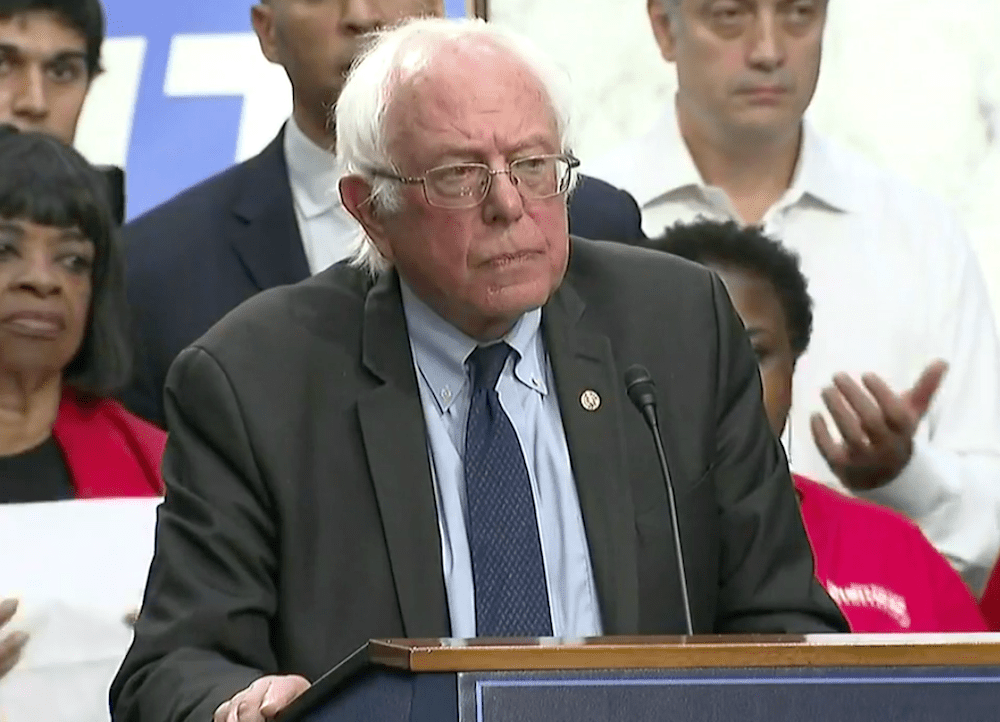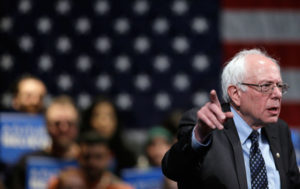Bernie Sanders Introduces Medicare for All Act (Video)
The Vermont senator, joined by Democratic co-sponsors, shares details of his widely anticipated health care proposal on Facebook. Sen. Bernie Sanders introducing his Medicare for All Act in Washington, D.C., on Wednesday. (Screen shot via Facebook)
Sen. Bernie Sanders introducing his Medicare for All Act in Washington, D.C., on Wednesday. (Screen shot via Facebook)
12:04 p.m. PDT Wednesday, Sept. 13: Flanked by Democratic sponsors and a range of supporters, Sen. Bernie Sanders officially introduced his Medicare for All Act in Washington, D.C., in an event streamed live on Facebook:
.@BernieSanders is introducing his #MedicareForAll legislation and the house is packed with nurses and other health professionals. pic.twitter.com/TbhFn5E0hS
— RoseAnn DeMoro (@RoseAnnDeMoro) September 13, 2017
Businessman Richard Master, founder of MCS Industries, also spoke. Master explained why businesses should support single-payer health care, saying that “growing health care costs pose a real existential threat to the American economy.”
“There is no doubt in my mind that the best way to ensure American competitiveness is with a single-payer system,” Master said.
Pharmaceutical companies may be growing concerned about Sanders’ new plan. Lee Fang of The Intercept notes that at least one CEO “is concerned that in an era of increasing political polarization, Americans will become fed up and embrace [Sanders’] single-payer health care plan.”
After Master spoke, Sanders took the stage again, attacking “waste, bureaucracy and profiteering” in the current health care system and explaining why our system is “economically unsustainable.”
“This is insane and unaffordable,” he said.
Sanders also addressed the economic aspect of “Medicare for all,” explaining that increased taxes “will be more than offset by the money you are saving from private insurance cost.” He addressed pharmaceutical companies, saying that “Americans are sick and tired of the greed” and would no longer be “ripped off” under his plan. He promised to “negotiate lower drug prices for the government and every single American.”
Sanders then focused on his political opponents in the Republican Party. “The crisis we are discussing today is not really about health care,” he said. “The crisis we are discussing today is a political crisis.”
He addressed the GOP directly: “Please don’t lecture us on health care … [you] have no credibility on the issue of health care.”
Sanders concluded by noting the importance of grass-roots support and direct participation.
Democratic co-sponsors of the bill took turns at the podium. They included Sens. Jeff Merkley of Oregon, Kirsten Gillibrand of New York, Elizabeth Warren of Massachusetts, Kamala Harris of California, Cory Booker of New Jersey, Mazie Hirono of Hawaii and Richard Blumenthal of Connecticut.
Blumenthal, the final speaker, urged Republicans to hold town halls and speak directly with their constituents about single-payer. “I guarantee you, you’ll get an earful,” he said.
Sanders wrapped up the event on a positive note: “Here is the simple truth. Our opponents on this issue have the money, and they have the power. But if millions of people across this country stand up, get involved in the political process, and fight back, I have no doubt—none whatsoever—that this nation, sooner than people believe, will in fact pass a Medicare for all, single-payer system.”
The full text of the bill is not yet available, but it “builds on Democratic congressman John Conyers’s expanded and improved proposal, introduced in the House on Feb. 10,” according to Quartz reporter Annalisa Merelli, who spoke with a Sanders aide. Read a Vox breakdown of the proposal here.
As Sanders presented his proposal, Republicans began a new attempt to dismantle the Affordable Care Act (ACA). Sens. Lindsey Graham of South Carolina and Bill Cassidy of Louisiana introduced a bill that would repeal many aspects of the ACA and slash Medicaid funding.
However, “time is running out on the bill,” The New York Times reports. “After Sept. 30, the Graham-Cassidy legislation would lose procedural protections that allow passage in the Senate with a simple majority, rather than the 60 votes often required for major legislation.”
The Times adds that about 60 percent of House Democrats support Sanders’ legislation. Watch Sanders’ full event in the video above.
Earlier: Sen. Bernie Sanders, I-Vt., is set to release his much-anticipated health care plan Wednesday in Washington, D.C. Numerous Democrats have voiced support for his “Medicare for all” legislation, but Sanders has also faced pushback from members of that party.
“Today is a historic day,” Sanders said in a press release Wednesday. “The time is now to address one of the great crises our nation faces. It is not acceptable that 28 million Americans have no health insurance and that even more are under-insured with high co-payments and deductibles. The time is now for a Medicare for All, single payer system. Health care must be a right, not a privilege.”
Washington Post reporter David Weigel, who got an early look at the legislation, shares key takeaways from Sanders’ plan:
The bill would revolutionize America’s health-care system, replacing it with a public system that would be paid for by higher taxes. Everything from emergency surgery to prescription drugs, from mental health to eye care, would be covered, with no co-payments. Americans younger than 18 would immediately obtain “universal Medicare cards,” while Americans not currently eligible for Medicare would be phased into the program over four years. Employer-provided health care would be replaced, with the employers paying higher taxes but no longer on the hook for insurance.
Ahead of the bill’s release, Sanders explained some of his solutions for a “rational health care system” to Vox’s Jeff Stein. In the interview, Sanders addressed three major questions surrounding the health care debate:
Should health care in the year 2017 in the United States of America be a right of all people? Or is it just the privilege of wealth? …
Or should we join the rest of the industrialized world and say that it doesn’t matter whether you’re rich or poor, young or old, healthy or sick—health care is a right. Every other major country on Earth has decided that health care is a right, and we’ve got to do the same. That’s No. 1.
No. 2: a very important question, which is virtually not discussed by the media or discussed here in Congress, and that is why is it that despite all those without any health insurance or who are underinsured, we end up spending almost twice as much per capita per person on health care as the people of any other nation? …
Thirdly, why are we paying the highest prices in the world for prescription drugs, so that one out of five Americans under 64 cannot afford the medicine that they need? Those are the questions that in fact we do answer in our legislation.
Sanders also delved into the economic issues surrounding American health care—or, as he put it, “Why is it that we’re spending so much compared to other countries?”
“Are we wasting an enormous amount of money in the current system? Most people would say yes. Can we take on the drug companies and the insurance companies and Wall Street and their unlimited sums of money to influence Congress? That is another issue, and that’s a major political struggle that we have to engage in,” Sanders said. “What I can say is we are going to be listing a number of revenue-raising proposals, which will generate more than enough money to pay for what we want to do.”
Sanders continued:
[Y]es, your taxes are going up. But if you are a middle-class person, you will be paying less overall for health care and taxes than you are paying today. That’s what our pledge is. Yes, you’ll be paying more in taxes, but you’ll be paying less—zero—in private insurance. So I think … Republicans will go around saying, “They’re raising your taxes.” They will forget that 30 seconds [in an ad that] I have to tell you you’re no longer paying private insurance if you’re a small business. You’re no longer having to provide insurance to your employees. So there are two sides of the equation.
Sanders pointed out at the conclusion of the interview that “the American people [are] moving in our direction.” Numerous polls show how support for single-payer health care is on the rise.
This doesn’t mean that changing American health care isn’t “going to take a lot of work.” Sanders recognizes the struggle ahead—a struggle he hopes most Americans will take part in.
“We are going to be mounting a massive grass-roots effort across this country to educate and to organize,” he said. “We’re going to have to take on Wall Street, the drug companies, the insurance companies, the corporate media. We’re going to have to explain what a Medicare for all, single-payer system means.”
Read the full interview here.
Your support matters…Independent journalism is under threat and overshadowed by heavily funded mainstream media.
You can help level the playing field. Become a member.
Your tax-deductible contribution keeps us digging beneath the headlines to give you thought-provoking, investigative reporting and analysis that unearths what's really happening- without compromise.
Give today to support our courageous, independent journalists.






You need to be a supporter to comment.
There are currently no responses to this article.
Be the first to respond.